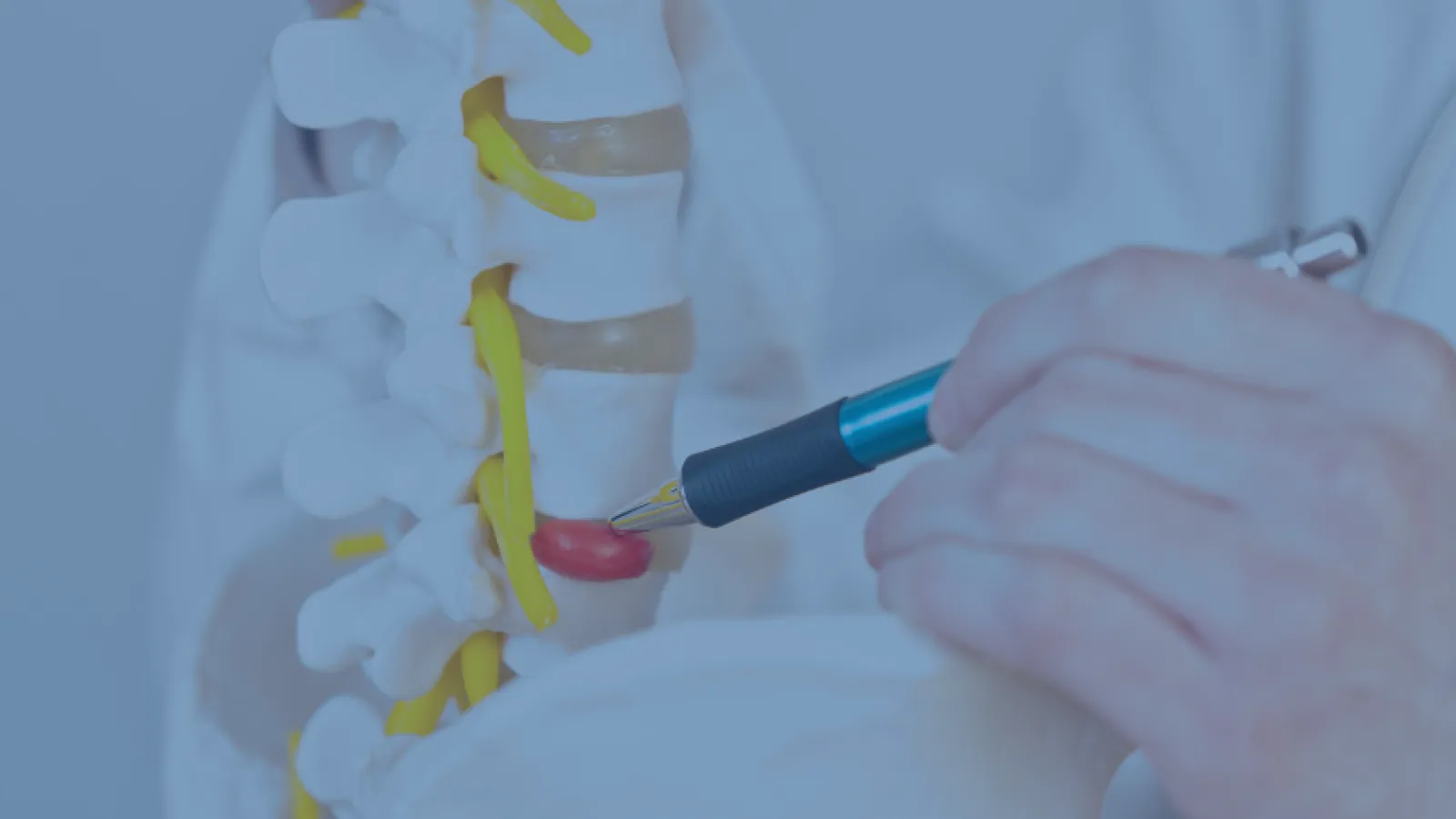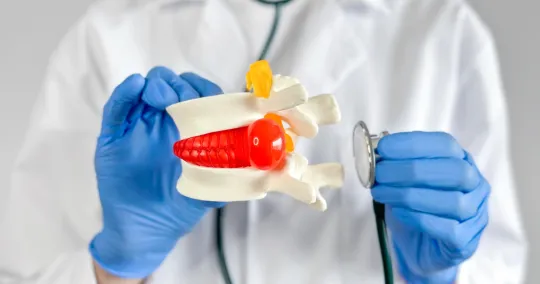
Herniated Disc Specialist in Lexington, KY
What is a Herniated Disc?
A herniated disc, sometimes referred to as a slipped or ruptured disc, occurs when one of the soft, jelly-like discs cushioning the vertebrae in your spine becomes damaged. This damage causes the inner material to push through a tear in the disc's outer layer, often resulting in pressure on nearby nerves. A herniated disc can cause pain, numbness, or weakness, typically affecting the lower back or neck but sometimes radiating to other parts of the body, such as the legs or arms.
At Bluegrass Orthopaedics, we believe in a collaborative approach to healthcare, where each patient is a partner in their treatment. Our team is dedicated to providing you with the knowledge and resources to make informed decisions about your spine conditions and treatment.

As a patient at Bluegrass Orthopaedics, you are always a partner in your medical care. Below you will find helpful information on a variety of orthopedic topics, including orthopedic conditions and various orthopedic surgical procedures.
The procedures found here are just some of those used by our orthopedic specialists. These interactive videos are meant to provide a general, educational overview. Please understand that each situation is unique, and no online content can replace one-on-one communication with your doctor.
If you have questions regarding a medical issue, please consult with your specialist at the time of your appointment.
What Causes a Herniated Disc?
A herniated disc often results from gradual, age-related wear and tear known as disc degeneration. As we age, spinal discs lose some of their water content, making them less flexible and more susceptible to damage. Other common causes and contributing factors include:
Injury or trauma: Sudden strain or impact, such as lifting a heavy object or a fall, can lead to disc herniation.
Repetitive motions: Jobs or activities that involve repetitive bending, twisting, or lifting can increase the risk.
Genetic predisposition: A family history of spinal issues can make you more likely to experience disc problems.
Our specialists at Bluegrass Orthopaedics are here to help identify the specific causes of your herniated disc, offering diagnostic expertise to create a treatment plan tailored to your needs.
Am I at Risk for a Herniated Disc?
Several risk factors can increase your likelihood of developing a herniated disc:
Age: People between the ages of 30 and 50 are most commonly affected.
Weight: Excess body weight places additional strain on the spine, increasing the risk of disc problems.
Occupation: Jobs that require heavy lifting, bending, or twisting put added stress on the spine.
Sedentary Lifestyle: Lack of regular exercise can contribute to muscle weakness and reduce spinal support.
Recognizing your risk factors is essential, as it can help you take preventative steps and identify symptoms early. If you suspect you may be at risk or are experiencing symptoms, our team at Bluegrass Orthopaedics is here to guide you through proactive steps to maintain spinal health.
How is a Herniated Disc Diagnosed?
Bluegrass Orthopaedics uses advanced diagnostic tools to accurately assess herniated discs and determine the extent of the condition. This typically includes a combination of physical exams, imaging tests (such as MRI or CT scans), and sometimes nerve tests to understand how the herniated disc impacts surrounding nerves. Our team will use these insights to develop a personalized treatment plan that addresses your specific symptoms and needs.
What Treatment Options Are Available?
At Bluegrass Orthopaedics, we offer a variety of treatment options for herniated discs, ranging from conservative therapies to advanced surgical solutions:
Non-surgical treatments: Initial treatment often involves rest, physical therapy, pain management, and anti-inflammatory medications. These can relieve pressure on the nerve and reduce pain for many patients.
Physical therapy: Strengthening exercises and mobility training can improve spine support and flexibility, helping to prevent future issues.
Minimally invasive procedures: If conservative treatments are ineffective, options such as steroid injections or minimally invasive surgeries, like microdiscectomy, may be recommended to alleviate pressure on the affected nerve.
Surgical options: In severe cases where other treatments fail, surgery such as discectomy or spinal fusion may be necessary to remove or stabilize the damaged disc.
Our experts work closely with you to determine the most appropriate treatment plan, ensuring you feel confident and informed about each step.
Herniated Disc Experts at Bluegrass Orthopaedics
For any questions or to discuss your treatment options, consult with your Bluegrass Orthopaedics specialist during your appointment. Remember, while online resources are valuable, nothing replaces the insights and guidance of an in-person consultation with your doctor. Book an appointment at Bluegrass Orthopaedics.
Serving
Near You
WE CAN HELP
WITH WHAT YOU NEED
-
Shoulder
-
Telemedicine
-
Orthopaedics
-
Foot &
Ankle -
Physical
Therapy -
Fracture
Care -
MRI &
Imaging -
Hand &
Wrist -
Hip
-
Pain
Management -
Knee
-
Spine
-
Sports
Medicine -
Total
Joint -
Work
Injuries -
EMG/NCV
Testing -
Walk-In
Clinic -
Elbow
Pain -
Bunion
Removal -
Foot and Ankle
Arthritis -
Patellar Tendonitis (Jumper’s
Knee) -
Knee
Bursitis -
Rotator Cuff
Surgery -
Shoulder Replacement
Surgery -
Trigger
Finger -
Hand
Fracture -
Hand and Wrist
Tendonitis -
Tennis
Elbow -
Osteoporosis
-
Herniated
Disc -
Acute Joint
Pain -
Closed
Fracture -
Aggravated Knee
Injury -
Sprains and
Strains -
Reconstructive Foot and
Ankle -
Swollen
Joint -
Osteoarthritis
-
Elbow
Fracture
As a patient at Bluegrass Orthopaedics, you are always a partner in your medical care. Below you will find helpful information on a variety of orthopedic topics, including orthopedic conditions and various orthopedic surgical procedures.
The procedures found here are just some of those used by our orthopedic specialists. These interactive videos are meant to provide a general, educational overview. Please understand that each situation is unique, and no online content can replace one-on-one communication with your doctor.
If you have questions regarding a medical issue, please consult with your specialist at the time of your appointment.
